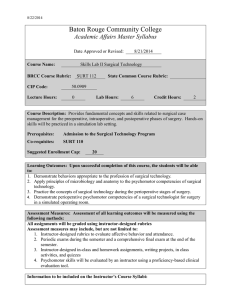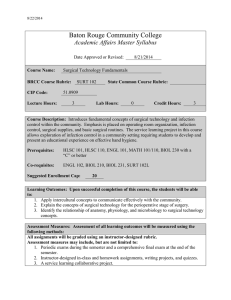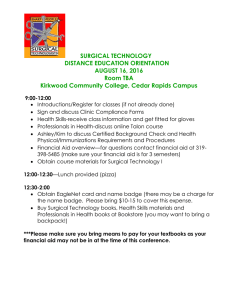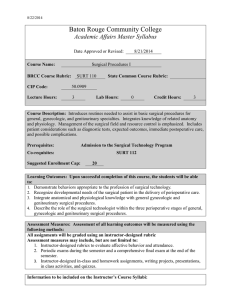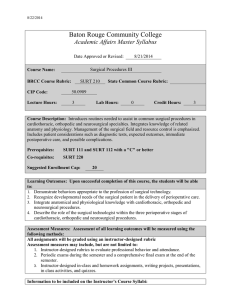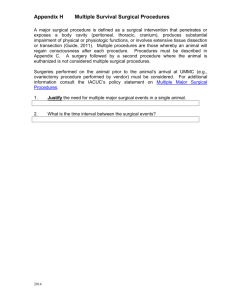Baton Rouge Community College Academic Affairs Master Syllabus
advertisement
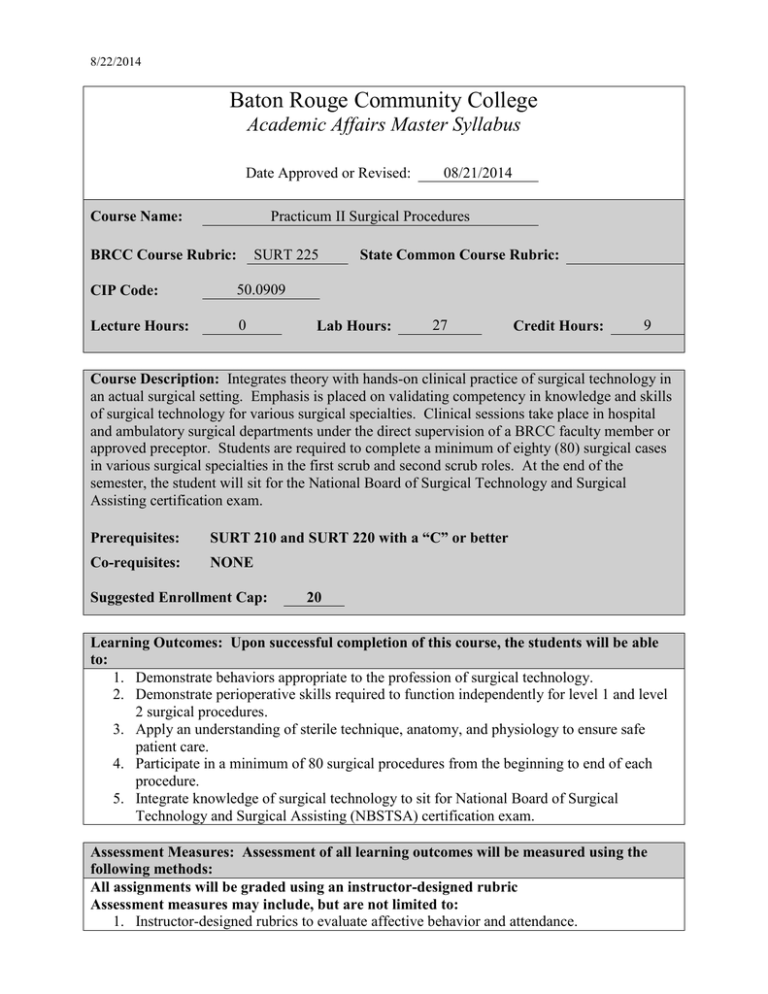
8/22/2014 Baton Rouge Community College Academic Affairs Master Syllabus Date Approved or Revised: 08/21/2014 Practicum II Surgical Procedures Course Name: SURT 225 BRCC Course Rubric: CIP Code: 50.0909 Lecture Hours: 0 State Common Course Rubric: Lab Hours: 27 Credit Hours: 9 Course Description: Integrates theory with hands-on clinical practice of surgical technology in an actual surgical setting. Emphasis is placed on validating competency in knowledge and skills of surgical technology for various surgical specialties. Clinical sessions take place in hospital and ambulatory surgical departments under the direct supervision of a BRCC faculty member or approved preceptor. Students are required to complete a minimum of eighty (80) surgical cases in various surgical specialties in the first scrub and second scrub roles. At the end of the semester, the student will sit for the National Board of Surgical Technology and Surgical Assisting certification exam. Prerequisites: SURT 210 and SURT 220 with a “C” or better Co-requisites: NONE Suggested Enrollment Cap: 20 Learning Outcomes: Upon successful completion of this course, the students will be able to: 1. Demonstrate behaviors appropriate to the profession of surgical technology. 2. Demonstrate perioperative skills required to function independently for level 1 and level 2 surgical procedures. 3. Apply an understanding of sterile technique, anatomy, and physiology to ensure safe patient care. 4. Participate in a minimum of 80 surgical procedures from the beginning to end of each procedure. 5. Integrate knowledge of surgical technology to sit for National Board of Surgical Technology and Surgical Assisting (NBSTSA) certification exam. Assessment Measures: Assessment of all learning outcomes will be measured using the following methods: All assignments will be graded using an instructor-designed rubric Assessment measures may include, but are not limited to: 1. Instructor-designed rubrics to evaluate affective behavior and attendance. 2. Direct evaluation using a proficiency-based clinical evaluation tools. 3. Clinical portfolios containing clinical documentation and self-assessments. 4. Instructor-designed assignments, writing projects, presentations, in class activities, quizzes, and exams. Information to be included on the Instructor’s Course Syllabi: Disability Statement: Baton Rouge Community College seeks to meet the needs of its students in many ways. See the Office of Disability Services to receive suggestions for disability statements that should be included in each syllabus. Grading: The College grading policy should be included in the course syllabus. Any special practices should also go here. This should include the instructor’s and/or the department’s policy for make-up work. For example in a speech course, “Speeches not given on due date will receive no grade higher than a sixty” or “Make-up work will not be accepted after the last day of class.” Attendance Policy: Include the overall attendance policy of the college. Instructors may want to add additional information in individual syllabi to meet the needs of their courses. General Policies: Instructors’ policy on the use of things such as beepers and cell phones and/or hand held programmable calculators should be covered in this section. Cheating and Plagiarism: This must be included in all syllabi and should include the penalties for incidents in a given class. Students should have a clear idea of what constitutes cheating in a given course. Safety Concerns: In some programs this may be a major issue. For example, “No student will be allowed in the safety lab without safety glasses.” General statements such as, “Items that may be harmful to one’s self or others should not be brought to class.” Library/ Learning Resources: Since the development of the total person is part of our mission, assignments in the library and/or the Learning Resources Center should be included to assist students in enhancing skills and in using resources. Students should be encouraged to use the library for reading enjoyment as part of lifelong learning. Expanded Course Outline: I. Perioperative Surgical Specialty Rotations A. B. C. D. E. F. G. H. I. Cardiothoracic General Gynecology Neurology Obstetrics Orthopedics Otolaryngology Pediatrics Peripheral vascular J. Plastic and reconstructive K. Urology 2
